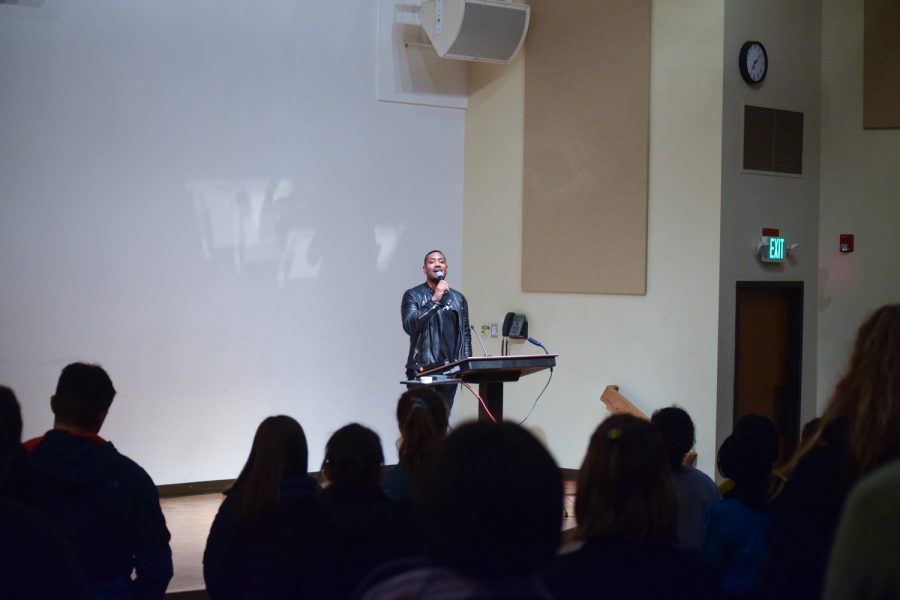Martin Luther King Jr. March Acts as Outlet for Community Activism
January 31, 2019
During the week of Jan. 21, Whitman students and faculty joined with local university and community members in commemorating Dr. Martin Luther King Jr. and his legacy.
The week’s events began with the “MLK Peace March” from Reid Campus Center through downtown Walla Walla to the Gesa Power House Theatre, featuring Tim Golden, Walla Walla University professor of Philosophy, the Whitman Freedom Singers and other Whitman students.
Maggi Banderas, Associate Director of Intercultural Center and coordinator of MLK Week events, was equally as enthusiastic as audience members about the performances at Gesa.
“I’ve received a lot of positive feedback for both events. For the march program I was excited to feature the Freedom Singers,” Banderas said. “I’m also always happy to collaborate with Walla Walla University, so having Professor Golden speak at the event was something I was looking forward to and I’ve heard it was very impactful for audience members.”
On Jan. 22, keynote speaker Bryan Terrell Clark addressed students at Maxey Auditorium about “his own experiences from growing up in Baltimore to his starring career on Broadway, most notably as George Washington in ‘Hamilton: The Musical’,” according to the Union Bulletin.
Clark emphasized the importance of aiming high and fulfilling those aspirations while positively influencing the world, a direct reference to King’s own design.
“The comments I’ve heard had spoken positively to [Clark’s] remarks being connected to Dr. King’s vision and purpose,” Banderas said. “I hope it was empowering for students who are seeking for their own direction.”
A film screening of “King in the Wilderness” occurred on Jan. 28 at 7 p.m. in Olin Auditorium, documenting King’s later years and the criticisms he received during this time.
Leisha Casimiro, a first year and singer in the Freedom Songs troupe, was deeply moved by the performances at the Gesa Power House Theatre. The presentation of King’s legacy and lessons by virtue of performance were executed artfully and raised critical questions about the culture of idolization.
“Dorothy Mukasa’s original song was haunting and emotional.… The poetry that Esther Ra recited was harrowingly genuine and true. The pieces Freedom Singers sung were filled with hope, calling for justice and unity,” Casimiro said. “A crucial point of [Bryan Clark’s] speech was why we celebrate the dead, but [disregarded] them when they were alive and fighting for rights.”
Banderas and Casimiro agreed that much of the meaning of Martin Luther King Jr. week comes from sources outside of the ones directly related to King’s legacy.
“With the march and all of our programming efforts, we hope to create a space to commemorate Dr. King’s vision, to celebrate his life and legacy, and to remind us all that we need to continue working for racial equality and justice,” Banderas said. “We also hold these events open to the community and in collaboration with Walla Walla University as an opportunity to reach out beyond our circles of influence to connect broadly as a community.”
Casimiro echoed this sentiment of the importance of cohesion, but also what this cohesion breeds and how this relates to the true purpose of MLK Week at Whitman.
“I believe Whitman had this commemoration not only to give people an opportunity to come together and interact, but to emphasize the importance of creating a community in regards to events such as these,” Casimiro said. “I think events like these inspire people to be more active in their community.”
The involvement of Whitman students within the community and during MLK Week is also an important outlet for expression and activism — in this case through the performing arts.
“It was very exciting to have two powerful original pieces created by Whitman students for this specific event,” Banderas said. “It speaks to the deep connection students have with Dr. King’s vision and their commitment to continue forward with the movement.”
But perhaps the most impactful thing about Martin Luther King Jr. Week is the fact that it brings people together in the spirit of betterment and change.
“[MLK Week] gives people who are still struggling with [human] rights hope — [hope] that there are allies and people who believe in the same cause,” Casimiro said.






